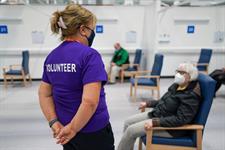Volunteering committees should help spearhead and permanently embed volunteering management and practice in the health and social care system in the wake of the Covid-19 pandemic.
New research published today argues that the volunteer resources made available during the pandemic must become ingrained in the NHS and social care to help deliver on proposed healthcare reforms.
The report was written in partnership with the Royal Voluntary Service and the research institute Public Policy Projects.
It identifies the huge strides made in volunteering practice during the pandemic and the opportunities for healthcare volunteering to be a major part of delivering on the NHS long-term plan, including its social prescribing ambitions.
Learnings from volunteer programmes such as the NHS Volunteer Responders scheme, delivered by RVS, must be incorporated into new delivery models, says the report, in a way that complements the work local voluntary organisations are doing in communities.
Nearly 400,000 people took part in the NHS Volunteer Responders programme, with participants answering more than 1.5 million requests for help with shopping deliveries, lifts to medical appointments, check in and chat calls, and stewarding shifts at vaccination sites.
Volunteers were able to access an app that allowed for short-term, one-off jobs to be sent directly to their phone when they were on duty, matching them to local people needing help.
The report says this revolutionised volunteering, and its authors make several recommendations about harnessing the volunteer effort post-Covid-19.
It says volunteer management should be improved by introducing a single recruitment and assessment process, supported by central and local government, the NHS, social care providers and voluntary, community and social enterprise organisations.
The report calls for more investment in volunteer support and requires anyone engaging volunteers across health and social care to have an annual per capita budget to invest in supporting their volunteers with training and development.
In addition, if healthcare inequalities are to be addressed and the most vulnerable communities supported, the report says the current level of volunteer engagement must continue nationally with the creation of volunteering committees within each integrated care system.
Catherine Johnstone, chief executive of RVS, said: “We have made huge strides and we can’t afford to lose what we have gained. Our attention must now turn to supporting volunteers to continue their engagement in the recovery from the pandemic.
“If we are to deliver health reforms and the integrated care model we are working towards, we must invest to achieve excellence and the shared understanding of the value of volunteering in the future.”
Earlier research by National Voices, a coalition of health and social care charities, found more funding was needed across the sector if increased demand for social prescribing was to be met.
